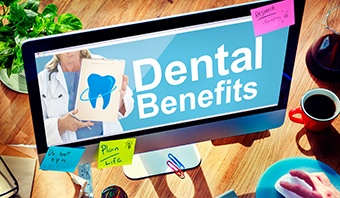
Emergency Dentist – Indian Land, SC
When You Need Help, Our Dental Office is Prepared
Are you experiencing a toothache that you just can’t ignore any longer? Did your child suffer from an oral injury that left their tooth chipped, cracked, or even knocked out? Unless your jaw is broken or you’re experiencing severe bleeding, you shouldn’t need to visit an emergency room for help. Instead, pay a visit to Dr. Candon and his team; they’ll make sure to get you out of discomfort and on the right path toward effective treatment during an appointment for emergency dentistry in Indian Land, SC. If you’re experiencing a dental emergency, call our dental office today!

Why Choose BridgeMill Dental Care for Emergency Dentistry?
- Sees Patients of All Ages
- Stay Calm Throughout Treatment with Nitrous Oxide
- Accepts Many In-Network Insurance Plans
How We Treat Dental Emergencies

- Schedule an Appointment: You should call our office as soon as you realize that you’re experiencing a dental emergency. Once we know what’s going on, we can give you first-aid advice and schedule an appointment for you.
- Emergency Examination: Before we can recommend any treatments, we will need to examine your mouth and gather more information about your emergency, such as what’s causing it and how severe it is.
- Review Findings: We will explain the results of our emergency exam to you so that you have a full grasp of what’s going on inside your mouth. Then we’ll work with you to create a treatment plan. When suggesting a specific dental service, we’ll give you an estimate of the cost and the expected timeline.
- Get the Care You Need: Based on the nature of your emergency, you might need a dental crown, a tooth extraction, or another treatment altogether. Whatever the case is, you can rest assured that we will aim to help you find relief as soon as possible.
The Most Common Dental Emergencies
There are many different types of dental emergencies, so the kind of treatment required to restore your oral health can vary from case to case. Below are some examples of common dental issues that can require emergency care. If you’re not sure whether your dental problem is truly urgent, call our office to see what our team recommends.
Understanding the Cost of Dental Emergencies

Dental emergencies are unpredictable, but we want to prepare you the best we can by providing you with some specifics on the cost of treatment. The price of care will vary based on many factors, which is why we’ve included some important information about the cost of emergency dentistry below. Read on to learn more and be sure to contact us if you have any questions.
Every Dental Emergency is Different

A visit to our practice for a dental emergency will typically be inexpensive. During your appointment, Dr. Candon will examine your mouth before determining what further treatment you may need to get out of pain and back to a healthy smile. Until he can see the root of the problem in person, it will be incredibly difficult to provide you with a precise cost estimate. We offer these common solutions for dental emergencies:
- Extractions
- Dental crowns
- TMJ treatment
- And more!
You can have peace of mind knowing that our team will explain what we find in your mouth, the treatment plan we recommend, and the estimated price before we begin so you know exactly what to expect.
Save Money by Taking Care of Your Smile

Unfortunately, dental emergencies can never be completely prevented. However, most of them are caused by unchecked damage or infection; thus, by investing a little bit in a good oral healthcare routine at home as well as regular visits to our office, you can potentially save thousands in avoided dental emergencies.
It’s also vital that you take care of your dental pain or emergency as soon as you notice it! If you’re concerned about costs, remember that the price of your treatment will only get higher if you wait and allow the issue to grow worse. For example, a swift visit to our office for a toothache could mean the difference between a tooth-saving root canal treatment or a complete extraction.
Does Dental Insurance Cover Dental Emergencies?

Most dental insurance providers offer some level of coverage for dental emergencies, but this will all depend on your plan. Usually, at least one emergency exam a year can be covered, and the most common treatments like root canal therapy, extractions, and more may be covered between 50% and 80%. Every plan has different maximums and benefits, which is why our team will work with you to confirm your coverage before you get treatment so there are no surprises.
Other Options for Making Dental Emergencies Affordable

No dental insurance? No worries! We offer various ways to make our quality emergency dentistry affordable for all budgets. Our in-house membership plan includes all the necessary dentistry you need plus 20% off the rest of our services for just one annual fee. The best part is that you and your whole family can take advantage of our membership plan. We also work with CareCredit to provide our patients with low-to-no-interest financing, where payment plans can be chosen based on your needs.
Keys to Preventing Dental Emergencies

The best way to avoid most dental emergencies is by simply practicing daily brushing and flossing as well as staying committed to routine dental appointments. It’s also important to never use your teeth as tools, such as when opening packages or bottles. Avoid habits like chewing on pens, pencils, or your fingernails. Purchase a custom-made nightguard if you struggle with chronic teeth grinding or clenching. Always wear a mouthguard when playing contact sports like football, basketball, or hockey.
Emergency Dentistry FAQs
Should I Go to the ER?
If this is your first time going through a dental emergency, it can be difficult to determine whether you should call a dentist or your local emergency room. The ER doctors may be able to stabilize you and get you out of pain, but they usually won’t be able to address the root of your problem. This is because hospitals rarely, if ever, have a dental professional on staff. For this reason, the most they’ll likely be able to do is prescribe painkillers or antibiotics.
For the majority of dental emergencies, you’re much better off giving us a call, as we can get to the bottom of your oral health issue. The only time you should visit the ER is if you’re bleeding profusely, your jawbone is fractured or broken, or you’re experiencing difficulty breathing or swallowing. Those emergencies are all considered life-threatening and warrant immediate medical attention.
How Can I Manage the Pain at Home?
Everyone has a different pain tolerance, so you might need something to alleviate your discomfort until you can reach our office. Some of the most effective ways of mitigating pain are:
- Over-the-counter pain medications like ibuprofen
- Topical pain reliever such as Orajel
- Ice pack, which also curbs swelling
A good rule of thumb to keep in mind is that healthy teeth don’t hurt. Even if your toothache is minor enough that you’re able to control it at home, you should still call us so we can determine if treatment is needed.
How Can I Get Rid of Facial Swelling?
Facial swelling is a common side effect of oral infections or trauma to the mouth. To decrease the amount of puffiness in your face or jaw, apply a cold compress to the area for 10 minutes on and 10 minutes off for up to an hour. Doing this should also help ease any pain.
I Need a Dental Checkup & Cleaning I Have a Cavity or Broken Tooth I am Missing 1 or More Teeth I Want to Enhance My Smile I am Concerned About Bleeding Gums I am Anxious/Afraid of the Dentist View Our Services